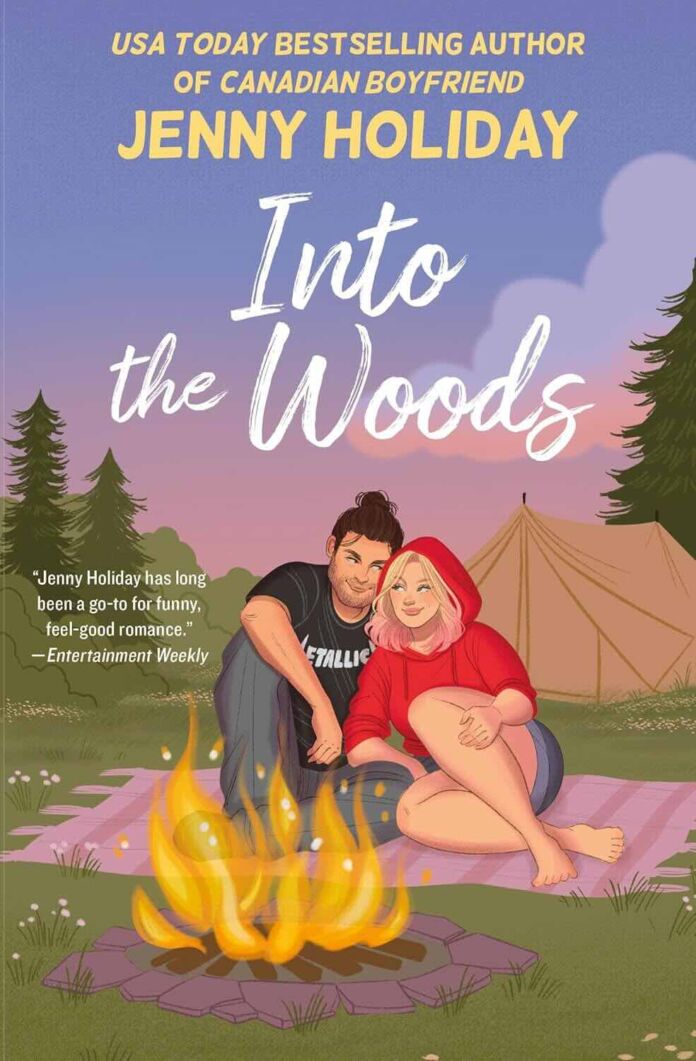Into the Woods marks Jenny Holiday’s latest contribution to contemporary romance, delivering a heartwarming yet substantive story about second chances, artistic rebirth, and the courage to embrace change. While maintaining her signature wit and charm seen in previous works like Canadian Boyfriend and the Matchmaker Bay series, Holiday ventures into deeper emotional territory with this enemies-to-lovers tale set against the backdrop of a summer arts camp.
Setting the Scene
The story unfolds at Wild Arts, a summer camp in Minnesota’s North Woods where two lost souls converge. Teddy Knight, a recently displaced bassist from the rock band Concrete Temple, arrives seeking solitude and inspiration for his revenge album. Meanwhile, Gretchen Miller, a dance studio owner approaching forty, comes to escape her dating disasters and embrace her self-proclaimed “crone” status. Their initial antagonism, sparked by a misunderstanding at the airport, sets up what appears to be a classic enemies-to-lovers arc – but Holiday subverts expectations by taking the story in more nuanced directions.
Character Depth and Development
Teddy Knight
Holiday crafts Teddy with remarkable complexity. Initially presenting as the stereotypical brooding musician, he reveals layers of vulnerability stemming from childhood abandonment and artistic codependence. His journey from angry ex-bandmate to someone capable of creating personally meaningful music parallels his emotional growth. The author skillfully weaves his musical background into the narrative, using his relationship with folk music to explore themes of authenticity and healing.
Gretchen Miller
Gretchen emerges as one of Holiday’s most fully realized heroines. Her struggle with maintaining independence while yearning for connection feels authentic and timely. The author deftly handles Gretchen’s mid-life crisis, avoiding clichés in favor of a thoughtful exploration of reinvention. Her “crone” ambitions serve as both comic relief and a clever metaphor for female empowerment.
Strengths and Notable Elements
Authentic Artistic Environment
Holiday excels at depicting the creative atmosphere of Wild Arts. The various artistic disciplines represented—music, dance, visual arts, writing—interact naturally, creating a rich backdrop for the main romance. The author’s attention to detail in describing artistic processes lends credibility to the setting.
Complex Supporting Cast
Secondary characters like Marion Kuhn, the camp director, and Jack Branksome, the cynical novelist, add depth to the narrative. The young musicians and dancers, particularly Anna with her prodigious talent, feel genuine rather than plot devices.
Thematic Depth
The novel tackles substantial themes including:
- Artistic authenticity versus commercial success
- The challenge of reinvention at mid-life
- The impact of childhood trauma on adult relationships
- The balance between independence and intimacy
Romance Development
The central romance builds gradually and believably. Holiday subverts the typical “camp romance” tropes by having her protagonists resist rather than lean into the summer fling aspect. Their connection develops through meaningful conversations about art, ambition, and personal growth. The physical chemistry, while strong, never overshadows their emotional bond.
Writing Style and Pacing
Holiday’s prose strikes an effective balance between wit and emotional resonance. The alternating perspectives between Teddy and Gretchen provide insight into both characters while maintaining narrative momentum. The author’s handling of the artistic elements—particularly music and dance—demonstrates research and understanding without becoming technical or alienating.
Areas for Improvement
While generally strong, the novel has a few minor weaknesses:
- The resolution of Teddy’s band drama feels slightly rushed
- Some readers might find the artistic focus overwhelming
- The “crone” metaphor, while clever, occasionally strains credibility
Target Audience and Appeal
Into the Woods by Jenny Holiday will resonate particularly with readers who:
- Enjoy romance with substantial character development
- Appreciate artistic themes and settings
- Are interested in stories about mid-life reinvention
- Like their romance with equal parts humor and emotional depth
Similar Works and Recommendations
Fans of this book might also enjoy:
- Emily Henry’s Beach Read for its exploration of creativity and romance
- Lucy Score’s Things We Never Got Over for complex small-town dynamics
- Tessa Bailey’s Window Shopping for character growth within romance
Final Verdict
Into the Woods by Jenny Holiday is a good read for its fresh take on contemporary romance tropes, strong character development, and meaningful exploration of artistic themes. Jenny Holiday has created a story that satisfies romance readers while offering deeper insights into creativity, personal growth, and the courage to change course mid-life.
The novel’s greatest strength lies in its ability to balance light moments with genuine emotional depth. While maintaining the warmth and humor expected from the genre, Holiday isn’t afraid to explore more complex terrain – from childhood trauma to professional reinvention.
Pros
- Rich, well-developed characters
- Authentic artistic setting
- Strong thematic depth
- Balanced humor and emotion
- Natural relationship development
Cons
- Some plot threads could be more fully resolved
- Artistic focus might not appeal to all readers
- Occasional stretches in premise credibility
Conclusion
Into the Woods represents Jenny Holiday at her most ambitious, successfully blending romance conventions with deeper explorations of artistic identity and personal growth. While maintaining her signature charm and humor, she delivers a story that resonates beyond typical genre boundaries. The novel stands as a testament to the possibility of finding love—and oneself—in unexpected places, making it a worthwhile read for both romance enthusiasts and general fiction readers.
For readers seeking a romance that offers more than just a love story, Into the Woods provides a satisfying blend of personal growth, artistic exploration, and authentic connection. Holiday proves that summer camp isn’t just for kids—sometimes it’s where adults go to find themselves, and maybe even love.





